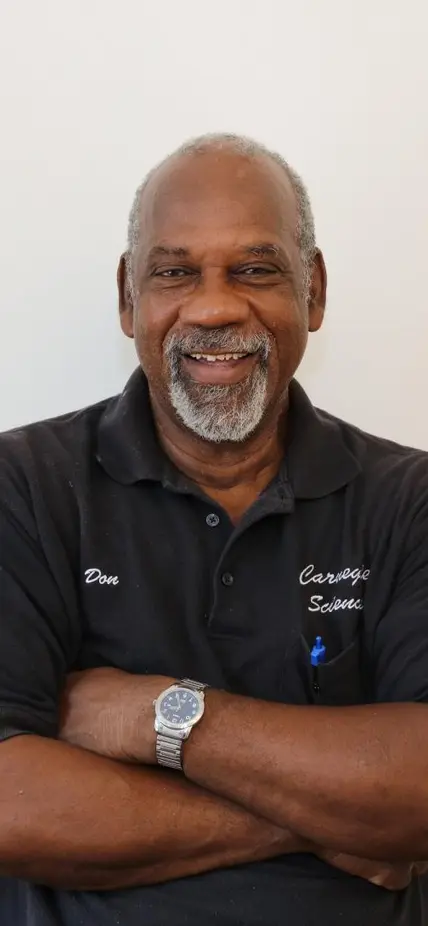Washington, DC— With more than a half-century of employment under his belt, Building Maintenance Specialist Don Brooks’ career traced the path of Carnegie’s modern administrative history. He died of complications related to coronavirus on October 24, just months shy of retirement. He was 75.
Brooks worked for Carnegie for 52 years, advancing through several positions over the course of seven presidential administrations at the institution, often interacting closely with leadership.
His first job was to help President Caryl Haskins to care for the ants and fish he housed in Carnegie’s downtown Washington, D.C., administrative building. Prior to his tenure at Carnegie, Haskins, a biophysicist, had written a popular science book on ants and continued working on several species, even converting more than one of the P St. building’s original classically designed rooms for research purposes.
“Oh yes, all those fish,” said his wife, Gloria Brooks, laughing as she reminisced about how Brooks would meet Haskins at the airport when he was returning from a fieldwork trip, so that he could collect new fish samples and bring them straight to the office.
Brooks loved to engage a crowd of colleagues from across the institution’s administrative and scientific staff with tales of Carnegie culture in different eras and of the drastic changes to our Logan Circle neighborhood since Haskins hired him. But one person stands out as Don’s most cherished relationship; he spoke often of his high esteem for President Emerita Maxine Singer, the National Medal of Science-winning molecular biologist.
“During my tenure as president, one of my priorities was to advance the accessibility of science—to our neighbors and to school children and teachers throughout the District. Don’s work played a vital role in our ability to open Carnegie’s doors to the DC community and welcome everyone in for our various programs,” she said. “Not only was he an outstanding employee for more than half a century, he was also a devoted friend for many years.”
In recent years, Brooks’ long experience with the historic building and relentlessly positive attitude helped Carnegie’s facilities team accomplish a remodeling project that modernized and optimized the health of our office spaces.
“I’ve never seen an employee as universally beloved as Don,” said Chief Operating Officer Timothy Doyle. “In moments of stress, he lightened everyone’s mood. And in moments of cheer, he was at the center of a crowd, telling a story and laughing with his signature chuckle.”
In 1966, Brooks and his wife's cousin moved to the District from Natchez, Mississippi, where he grew up with eight siblings picking cotton and vegetables on family owned farmland and other nearby properties.
His younger brother, Leroy Brooks, reminisced about how he, Don, and two of their brothers participated in Civil Rights marches and rallies in the area—on one memorable occasion all four being arrested on the same night.
Brooks also took odd jobs at the local stockyard, bowling alley, and golf club. The latter is where he developed a lifelong love affair with the sport, often spending his weekends at a local course.
“The entire Carnegie Community mourns Don’s untimely passing. He will be remembered as a dedicated friend and colleague. I extend my deepest sympathies to his wife, Gloria, and their family,” said Carnegie President Eric. D. Isaacs.
Brooks is survived by his wife, 4 children, 14 grandchildren, and 10 great-grandchildren, as well as by two sisters and three brothers.
